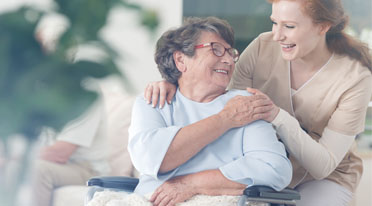6 Tips to Prepare a Caregiver Survival Kit
Many individuals make the decision to care for their elderly loved one. This is such a beautiful and noble decision. For those who choose to do this, it is imperative that the caregiver is prepared for an emergency. Emergencies aren’t just about pandemics. They are about flash floods, living in flood zones, earthquakes (which happen more and more in areas where we don’t necessarily expect these to occur and cause substantial damage), hurricanes, wildfires, and other devastating natural disasters in addition to personal unexpected disasters such as house fires, job loss of the caregiver, or even foreclosure of the family home.
Being a caregiver is stressful. Ensuring that you’re prepared for an emergency can make the difference between survival (physically, mentally, and emotionally) and not knowing what comes next.
Because September is Emergency Preparedness month and the beginning of hurricane season, this blog post is brought to you by Steve Watrel, The Nursing Home Abuse Expert®. As a caregiver, we understand the responsibilities you face as you care for your loved one regardless of whether they’re living with you full-time, you care for them part-time as they reside in their own home, or if they’re in a nursing home or assisted living facility.
Emergency Preparedness: Know the Risks for Your Area
Before you determine what should be part of your caregiver survival kit and emergency preparedness plan, you must know the risks for your area and/or the area of your loved one. For example, are you and/or your loved one in:
- A flood zone
- An area that may be prone to hurricanes
- An area that is known to be at risk for tornadoes
- An area that is known to experience damage from rock or mud slides
- An area that could be prone to wildfires
While Florida is an area that could certainly see flooding from hurricanes, tropical storms, and heavy rains regardless of where you or your loved one lives in the state, the same could likely be said for wildfires depending on whether your area is getting enough rain. We mention this as an example because before you can create an emergency preparedness plan, you must take an honest look at the risks that exist. Therefore, while it may seem simplistic for us to suggest that you make a list of what emergencies you may likely and realistically face, this is a crucial step in preparation as a caregiver.
Create an Escape Route
For each emergency plan you create, you need to include an escape route. If you create an emergency plan to leave the area because of a hurricane, create an escape route with more than one escape route. We know you’ve seen the news with footage of highways with standstill traffic. So, think outside the proverbial box – and make sure that the routes you choose aren’t closed because of construction. For house fires, ensure that everyone within your home knows the escape plan and practices it. It’s also important to make sure that everyone knows the meeting spot.
Check that your escape plans are accessible for your elderly loved one. Review your plans on a regular basis to make sure that changes don’t need to be made for safety reasons.
Designate an Emergency Coordinator
An Emergency Coordinator is someone who doesn’t live in your area. It is a person who lives in a safe zone. This is a person who can contact others in your family or in your network on your behalf. They know your emergency plan as a caregiver. They can make phone calls on your behalf. They can help you, even from a distance, with insurance calls, make phone calls to set appointments with health care professionals, call utility providers, or help you in other ways. Please note that when you create your plan, you may need to contact the insurance company, utility providers, and health providers to give them this person’s name so that they know they may speak with this person on your behalf in the event of an emergency such as a natural disaster. Some utility companies may also request that a passcode be placed on the account and that the Emergency Coordinator have this word.
Pack an Emergency Preparedness Kit
To create an emergency preparedness kit for your elderly loved one, choose a suitcase or other waterproof container that is large enough to hold several days worth of clothing along with the necessary medical equipment, such as a pill organizer, pill bottles, portable oxygen, and any other necessities along with bathing equipment. Ensure that they will also have access to their walker, cane, crutches, or wheelchair. Everything should also be labeled to include their name and contact information.
It would also be helpful to create an emergency preparedness kit for everyone within your household as well.
Food and Emergency Preparedness
In addition to meeting the medical needs of your loved one, food is an obvious necessity for them and for you. Start the preparations now by stocking up a seven day nonperishable food supply along with bottled water. This can be done in several ways, depending on the nutritional needs (and allergies), likes, and dislikes. This can also be done in a budget-friendly way. There are many budget-friendly videos on YouTube for finding and storing non-perishable food items for emergencies that are more than just buying canned goods.
Store and Protect Important Documents
What’s worse than getting stuck in a natural disaster or other emergency? Not being able to access your important documents to get the help you or your loved one may need. Part of your caregiver survival kit should include storing and protecting your important documents. You have several options, of course. Two of the easiest include:
- Getting a scanning app for your smartphone. With this option, you can scan all of your important documents and save them to a secure cloud. If you don’t have immediate access to your physical documents, at least you have emergency access to digital copies.
- Buying a fireproof and waterproof safe and storing your documents inside of it. If you choose this option, it is crucial that you remember to put the safe with the remainder of your emergency kit so that you can take it with you if you must flee. You may need these documents to obtain care or prove identity to obtain certain services or even apply for FEMA.
Questions about Your Loved One’s Care in a Nursing Home?
Emergency preparedness is essential, but one thing that you’re never prepared to find out is that your loved one is being abused or neglected in a nursing home. If you have questions about their care, Steve Watrel, The Nursing Home Abuse Expert® is here to guide you and help you find out the truth. Schedule your consultation now by calling us: (904) 747-9672.




